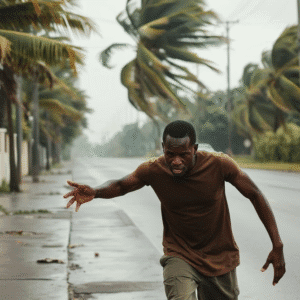“Breeze Buss Pipe and Tek Light: Another Episode in JPS Chronicles”

At this point, we might as well admit it: in Jamaica, electricity is not so much a utility as it is a privilege. And on Monday, Mother Nature flung off her wig, flared up her skirt, and declared she’d had enough.
A squall line; yes, that’s the official name, not a dancehall group—swooped down on the island like an uninvited cousin at a Sunday dinner and proceeded to remind 50,000 Jamaicans just how fragile the current really is.
Seven per cent of JPS’s customer base was affected. In JPS terms, this means that only the customers who pay regularly were affected. Because let’s be honest—if you’re stealing light, the squall line probably just took a break before resuming normal service.
Now, before we go full angry-uncle-at-a-barbecue on JPS, let’s be fair. Strong winds did roll through. Wires were flung like spaghetti noodles, transformers blinked out like overworked bartenders, and poles possibly gave up and leaned into early retirement.
The company, to its credit, activated the “Incident Command Centre” (which sounds very official and cinematic, doesn’t it?), and dispatched crews with heroic urgency… at least to Half-Way Tree and the uptown areas.
But here’s where the humour gives way to concern.
Jamaica’s infrastructure continues to live in the emotional state of a clingy ex, overly sensitive and prone to collapse at the slightest disturbance. Whether it’s a drizzle, a gust, or someone sneezing near a utility pole, we’re always one step away from a blackout. The question is not “if” the lights will go out, but “when” and “for how long.”
And therein lies the bigger issue.
We’re a nation with world-class athletes, groundbreaking artists, and vibrant culture. Yet we still treat electricity like a candlelight dinner — occasional, flickering, and full of uncertainty. How can we seriously talk about digital transformation and a modern economy when a simple squall line can cripple five parishes?
Let’s talk to the genie we just rubbed out of the lamp
· JPS must modernise the grid. Climate change is not going anywhere, and “emergency response” shouldn’t feel like a temporary band-aid on a decades-old fracture.
· The government needs to apply pressure. Regulation without teeth is just a polite suggestion. If we’re paying world-class rates, we need world-class infrastructure.
· Citizens must demand better. Tweeting in the dark isn’t advocacy. We need organised accountability. After all, a seven per cent outage is seven per cent too much in an age where children attend school online and home-based businesses run on digital clocks.
And to the average Jamaican reading this by candlelight or beside a charging power bank: I see you. You’ve paid your bill, stocked up on batteries, and yet still have to whisper, “Don’t flush the toilet, the pump not working.”
So yes, JPS says they’re working “as safely and quickly as possible.” That’s good. But we need to move past reactive fixes and invest in proactive resilience. Because if a squall line, a fancy term for “bad breeze” can knock us out like this, what happens when a real storm shows up?
Until then, stay safe. Stay charged. And keep the candles nearby just in case the breeze gets ideas again.



